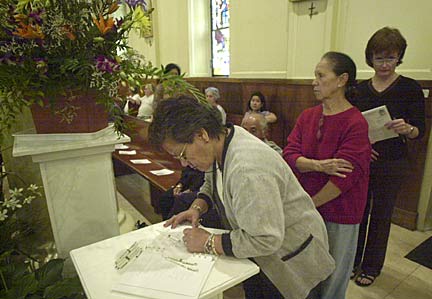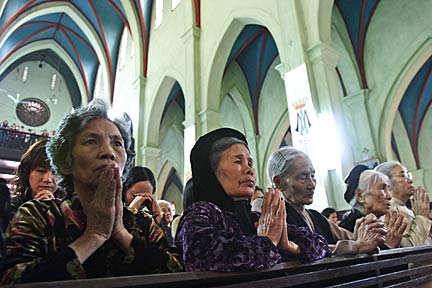1920-2005
Into God’s embrace

|
Oahu faithful
offer prayers
Several hundred worshipers filled Our Lady of Peace Cathedral in downtown Honolulu at 5 p.m. yesterday, offering prayers for Pope John Paul II.
"On this day when our Holy Father died and went to the Lord, we give thanks," the Very Rev. Thomas Gross, diocesan administrator for the Honolulu Diocese, said in opening the special Mass in Honolulu's oldest Catholic Church.
Gross asked for prayers for the pope several times during the hourlong service, and made the pontiff's service to the church and to the world the subject of his homily.
During the many years that John Paul II led the church, Gross said, "he inspired the world, worked for peace, for the poor and for God. He believed in the power of truth and peace ... and world leaders could not ignore him."
The pope inspired Catholics to "open their hearts" and examine their faith, Gross said.

The Rev. Thomas Gross sprinkled water on attendees at a special Mass yesterday at the Cathedral of Our Lady of Peace, the city's oldest Catholic church. Several hundred worshipers offered prayers for Pope John Paul II.
"He was instrumental in the downfall of communism in Europe, alerted the world to the pandemic of AIDS in Africa" and stood strong against the death penalty, abortion and fetal stem-cell research, Gross said.
"The mystery we celebrate in this season (of Easter) was the basis of his strength and hope," Gross said. "'Be not afraid,' the Holy Father said when he became pope. All who open their lives to Christ have nothing to fear in this life or after."
Louis Lopez of Moanalua said he had made a point of attending the Mass for the pope.
"I have feelings of sorrow and feelings of joy," Lopez said. "Heaven should be very happy with him."
At the same time, the pope's death is a reminder that everybody dies, Lopez said.
"I thought he was a great man," said Lenny Sabatino, who served communion wine at the Mass. "He's done a lot for us as a church and done a lot for humanity. The world is messed up as it is. Things might have been worse had he not been so true to his faith."
"It's going to be weird," she said Rebecca Trowbridge, a student at Sacred Hearts School, when the new pope's name is inserted into prayers. John Paul II has been pope her whole life.

Shortie Mariano signed a book of condolences that will be sent to the Vatican next week.
Gov. Linda Lingle issued a statement saying the pope had "touched millions of lives with a heartfelt message of faith, love and understanding."
"Having experienced the horror of Nazi occupation as a young man in his native Poland, he spoke with a deep personal conviction when calling for international peace," Lingle said. "And he shared those words of wisdom with more individuals than any pope in history."
Lt. Gov. Duke Aiona, who is Catholic, said he felt the loss at a "very personal level."
"Pope John Paul was a champion of peace whose compassion for humanity crossed all faiths and cultures," Aiona said. "He was truly a man of God."
Flags were flown at half-staff yesterday in the pope's honor.
Mayor Mufi Hannemann said in a statement that the pope's efforts on "behalf of world peace transcended divisions of culture or faith." He added that it was fitting that, in his final hours, "he chose not to leave the Vatican, but insisted on remaining close to the people who were gathered outside his residence."
"As his health failed in recent years, he publicly identified with the suffering of Christ and the suffering of people around the world," Gross said in a statement, "demonstrating by his own example the sanctity of life and the God-given dignity of all human beings. The world has lost an extraordinary man, a superb shepherd who was loved by untold millions."

|
Pope’s valiant final days
eclipse all controversy
John Paul II's death brings an
outpouring of unfettered good will
for the divided church
The courage Pope John Paul II showed in his final days sparked a sustained outpouring of reverence, both for him and the Roman Catholic Church, at a time when the faith's image has been battered by scandal, parish closings and financial troubles.
Around the clock and around the globe, tributes on television newscasts and at public services gave the church a moment of nearly unfettered good will that is likely to continue at least through the funeral ceremonies of the next week.
"Obviously, you never speak ill of the dead or the dying. But I think this moment and this pope transcend that," said David Gibson, author of "The Coming Catholic Church."
Largely forgotten for the moment are liberal Catholics' long-standing criticisms of the pope's strict church policies and parishioners' lingering anger at bishops for the clerical sex-abuse scandal that erupted three years ago in the United States, leading to bankruptcy in three dioceses.
Gibson thinks that the human drama of John Paul's decline -- his continued efforts to lead the church right up to his last hours -- "helps people move past a lot of the agony and bickering and pain and scandal of these recent years."
He and Chester Gillis, theology chairman at Georgetown University, agree that both liberals and conservatives have, in Gillis' words, "galvanized around the person, not necessarily the teaching or the discipline of the church that he maintained."
"Even though people disagreed with him on things, he was a remarkable world leader and communicator, an unusual intellect, a polyglot," Gillis said. "The combination of skills and gifts this man possessed was rare, and people appreciate that."
The lingering papal death watch produced warm tributes from politicians -- President Bush called him "a champion of human dignity and freedom" -- on down to many ordinary parishioners.
The attention has not only been a boost for the church in the United States, but also in increasingly secular Europe, where the media have given events in the Holy See intense attention -- especially in countries with a Catholic tradition.
The pope's health was a central theme for weeks on Austria's state television, and his sufferings filled newspaper front pages.
In Portugal, which John Paul visited three times, several newspapers issued special Saturday editions, including a 24-page supplement in Diario de Noticias.
And the global importance of the pope's church has been symbolized by the ongoing television images of St. Peter's Square, providing a visible sense of strength, majesty and mystery.
"All the ceremonies, the ritual, the richness of the symbolism surfaces again, and those outside the Catholic community have a curiosity and an interest. There's something here that speaks to longevity and continuity," Gillis said.
Back in America, telecasts through the pope's last days gave ample face time to cardinals and Catholic theologians who are unknown to the public under ordinary circumstances.
In the swirl of media coverage, rare downbeat remarks came from Mort Kondracke of Roll Call, who said Friday on America's Fox News Channel that the pope had disappointed liberals and called the clergy molesting scandal "the eternal blight on this papacy."
But when he raised the molesting issue a second time, moderator Chris Wallace added: "We certainly want to leave on a higher note than that. He was a remarkable man, a political and religious giant."
To Gibson, a convert from Protestantism, it all shows that the Catholic Church "is much less about institutions than it is about the spiritual journey we're all on."
"This is what the church is all about in the end: baptizing your babies, marrying your children and burying your dead."
Conservatism
brought criticism
The pope's policies on birth control
and other issues drew fire for
being out of date
VATICAN CITY » He opposed divorce, birth control and abortion, the ordination of women and the lifting of the celibacy requirement for priests.
To his critics, Pope John Paul II refused to keep pace with the demands of his flock or any of the changes in the modern world.
To John Paul, it was a question of protecting what he called the "truths of the faith."
John Paul's conservatism was often seen as coming from his formation in the Polish Catholic Church, a body that remained immune to liberalizing trends in the West during the four decades of communist rule.
During his 26-year papacy, dissenting theologians were disciplined and bishops who bucked directives from the Vatican were replaced by prelates more in line with John Paul's thinking.
He pushed his bishops to hold the line against gay marriage and tried to shut off debate on whether women could be ordained.
In one of the few concessions to the liberal wing, John Paul formally permitted women to serve at the altar, approving a practice that was already widespread in the United States and Western Europe.
The Vatican was frequently criticized for its opposition to the use of condoms in fighting AIDS, a position that stemmed from its condemnation of artificial birth control.
When the church in the United States, Ireland, Australia and elsewhere was hit by the clergy sex abuse scandal that undermined its moral voice and damaged it financially, some blamed the celibacy requirement for discouraging many potential candidates for the priesthood.
The pope refused to budge on that issue, or other points. He once told reporters that the Catholic Church should not be viewed as a democracy or an association of "free thinkers."
One of John Paul's fiercest critics, the dissident Swiss theologian Hans Kueng, charged that "the upshot is that the Catholic Church has completely lost the credibility it once enjoyed under the papacy of John XXIII and in the wake of the Second Vatican Council."
In the 1960s, that council approved a series of liberalizing reforms that ranged from allowing Mass in modern languages instead of only Latin to calling for improved and closer relations with other Christian denominations and other religions.
John Paul insisted he supported the reforms, but not the abuses he believed they created.
There were questions about whether John Paul's unyielding stands cost the church influence despite a flock numbering more than 1 billion people in the world.
Europeans began turning their backs on church positions. In the United States, the issue of abortion rights became embroiled in politics when several bishops said they would deny communion to any Catholic politician who supported a woman's right to abortion even if they were personally against it.
[News] [Business] [Features] [Sports] [Editorial] [Do It Electric!]
[Classified Ads] [Search] [Subscribe] [Info] [Letter to Editor]
[Feedback]
